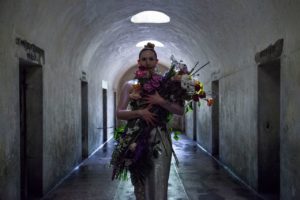
New York Opera fest 2018 Review: The Rose Elf — Hertzberg – Ousley Team Stage a Graveyard Smash
By Logan MartellThis review is for the performance on June 8, 2018.
This year’s Opera Fest has seen a number of fresh and highly inventive works. David Hertzberg’s “The Rose Elf” offers an immersive, and almost unbearably-intimate recount of Hans Christian Andersen’s fairy tale.
Staged within the catacombs of Brooklyn’s Green-Wood Cemetery, the audience seated themselves on opposite sides of the long tunnel no more than 10ft wide, the orchestra positioned at the very end. The only feature that could be said of such a minimal location were the number of alcoves which allowed the performers to make nearly-instant exits as needed. While suggestive of the more magical aspects the plot is situated within, it felt reminiscent of the hallway gag from Scooby – Doo. All humor, however, ends there.
The opera begins and we find a pair of lovers, listed as “The Girl/Luna,” and “The Beloved/Horus,” in an emotionally-charged ballet, complete with showering of rose petals. Unbeknownst to them, an Elf, played by Samantha Hankey, finds herself quite literally caught in the middle of this passionate display. While the Elf is too small for the lovers to see, Hankey herself is undoubtedly the center of attention as she suffers between their embraces. It’s worth noting the distinction in costume between the characters. While Hankey as the Elf wears a silvery gown, the others, who for all purposes of the plot seem to be human, wear form-fitting floral prints and makeup that would strongly suggest otherwise.
As the titular Rose Elf, Samantha Hankey was something of a charming contradiction: practically helpless, but tremendous in both voice and presence. Within the confines of the catacombs, there were even moments when Hankey’s resonance could be felt through my very clothes. As part of her costume design, Hankey’s hands were painted a deep pink as if they had been stained in blood nearly up to her elbows; when I noticed the same tinge covering hear ears, it seemed as though she had been desperately trying to shut out all the events she was at the mercy of. By the end of the evening, Hankey had become something of a guardian angel, comforting Luna in her grief to the soaring of the orchestra’s strings.
Bringing the lovemaking to an end is Andrew Bogard in the role of Luna’s brother, whose haunting bass was fit for any crypt and added great power to the lines of Hertzberg’s libretto. While Bogard’s portrayal carried a loathsome menace around the character, the brother himself seemed evil for the sake of evil, quickly murdering Horus and slowly dragging his body down the tunnel, almost entirely silent except for the sound of fabric scraping against the stone floor. Adding insult to injury, he lays the corpse on top of his sleeping sister, and even goes so far as to physically crawl on top of them like some utterly hateful reptile. When The Brother is killed by the spirits living within the Jasmine flower grown from Horus’ corpse, Bogard receives a fitting end ostensibly crushed under a shower of petals.
Luna and Horus, played by Alisa Jordheim and Kyle Bielfield respectively, were rather lacking as characters in their own right, but this was offset by the passion with which Jordheim and Bielfield embodied them. As soon as Horus dies, which happens fairly soon into the opera, Jordheim is throw into hysterical grief clear from her shaking hands and visceral cries when she first is presented with the corpse. Bielfield himself managed to retain a strong presence throughout the night, impressive considering that he spent most of that time lying dead on the floor. After the death of The Brother and Luna’s own passing, Jordheim and Bielfield are now free, as spirits, to engage in a final duet featuring resplendent harmonies, bells, and more, bringing the opera to a powerful finish.
Musically, Hertzberg’s composition does not seem to have any clear-cut musical numbers or arias, instead favoring arioso which made the most of the environment. Despite this, there was no lack of emotion from both the orchestra and the performers.
Before the performance, patrons are provided with the text of “The Rose Elf”, which makes for a helpful bit of pre-show homework. Without this, it would seem difficult to follow the arc of the story as its performed, there’s simply a deluge of sensory input to account for between the music, the scent of flowers all about, and even the lingering spice of the rye whiskey from the reception. Add to this strong concoction a pair of lovers dancing and dying just on the boundary of the audience’s personal space and it’s not hard to see how “The Rose Elf” becomes a truly gripping work, and one that I unknowingly found myself trying to process physically and emotionally rather than intellectually. The entire work was no longer than an hour, and while it was an intense one, there would have been much to gain by taking more time to explore the characters and the world Hans Christian Andersen constructed. If I sound uncomfortable in this review, then that is very much to the credit of Hertzberg, his creative team, and the otherworldly cast.


